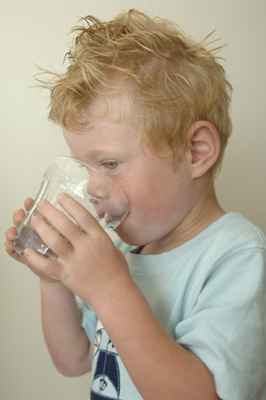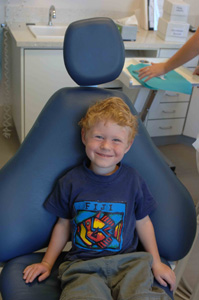Baby and Toddler Oral Care

Baby and Toddler Oral Care
In an effort to raise awareness about the factors contributing to Early Childhood Caries (ECC), the Australian Dental Association (ADA) is launching a community health initiative to assist parents and carers of babies and toddlers on preventative oral care.
Research has found that the state of a mother's oral health can have an influence on the future oral health of her newborn.
Findings from numerous overseas studies show how a particular bacteria, Streptococcus mutans, which is linked to dental decay, can be transferred from a parent's mouth to the mouth of their baby, which in turn can predispose the baby to dental decay.
To help minimise transferring bacteria from your mouth to your child's mouth, do the following:
Research has found that the state of a mother's oral health can have an influence on the future oral health of her newborn.
Findings from numerous overseas studies show how a particular bacteria, Streptococcus mutans, which is linked to dental decay, can be transferred from a parent's mouth to the mouth of their baby, which in turn can predispose the baby to dental decay.
To help minimise transferring bacteria from your mouth to your child's mouth, do the following:
Brush your teeth twice a day
Floss daily
Drink fluoridated tap water
Limit your intake of high sugar foods
Make sure you have regular dental check ups
In recent years, data has also shown an increase in the incidence of decay that effect primary or baby teeth.
Research from the Australian Institute of Health and Welfare (The Child Dental Health Surveys 1997, 1998, 1999, 2002) has shown a steady increase in decayed, missing or filled teeth in four year olds. While Australian children enjoy good oral health overall, and dental decay rates have improved since the introduction of water fluoridation in the '60s, dietary factors such as increased frequency of consumption of sugary foods and drinks, drinking less fluoridated tap water and poorer oral hygiene habits, have contributed to the increase.
Early childhood caries can have a significant impact on a young child's overall health. ECC is linked to symptoms such as pain, infection, abscesses, gastrointestinal disorders, malnutrition and retarded growth due to loss of appetite. As such, preventative measures from an early age contribute significantly in helping to prevent ECC.
While a baby's first dental visit should be scheduled within six months of the appearance of the first tooth, Australian research on pre-school children in South Australia showed that only 2.2% of the children had seen a dentist by two years of age and only 10.7% had seen a dentist by three years of age.
Healthy eating equals healthy teeth
Diet plays a critically important role in the health of your child's teeth. Developing healthy eating habits early in life will help ensure strong and healthy adult teeth.
Early Childhood Caries:
As soon as your baby develops their first tooth, they are at risk of dental decay. Decay in babies and a toddler is known as Early Childhood Caries (ECC). To help prevent ECC, follow the guidelines below:
Did You Know?
Some medicines contain sugar for taste. If your child is prescribed medicine, ask your doctor if this can be sugar free.
Xylitol is a natural sweetener. Foods containing sugar substitutes appear to reduce decay-causing bacteria. Ask your dentist if xylitol products (such as cough syrups or lozenges) would be useful in reducing your children's risk of tooth decay.
Fluoride
Fluoride is a natural mineral that strengthens teeth and protects against decay. Most capital cities in Australia add fluoride to the water supply at recommended levels. Your dentist can tell you if your local water supply is fluoridated.
Bottled water usually does not contain enough fluoride to offer protection against tooth decay. Some home water filters remove fluoride from tap water. Storage-tank water does not contain fluoride. If your child drinks the majority of their water from bottled or filtered water or tanks, then talk to your dentist about your child's individual fluoride needs. If necessary, the dentist can apply 'topical' fluoride to their teeth, which has been proven to reduce childhood tooth decay.
Soft Drinks
Most people are aware that soft drinks contribute to tooth decay due to the significant amount of sugar that these drinks contain - a 600ml bottle can contain up to 13 teaspoons of sugar.
Less well known is that these drinks, along with fruit juices, cordials and sports drinks often have high acid levels, and can play a major role in the development of tooth erosion. Dental erosion is a silent epidemic. Soft drinks, fruit juices, cordials and sports drinks should be limited. Encourage your child to drink fluoridated water as much as possible.

Interview with Dr James Lucas and Dr Caroline Howarth
The following answers have been completed by Dr James Lucas M.D.Sc.,L.D.S.,F.R.A.C.D.S.,F.I.C.D Specialist Paediatric Dentist Clinical Associate Professor of Melbourne University and Dr Caroline Howarth BDS (Hons), MMedsci (OSura), SDSRCS (Eng), Grad Dip Clin Dent, DCD (Paedo) Specialist Paediatric Dentist.Why did you think it was important to begin the campaign 'Let's Talk Baby Teeth'?
Dr James Lucas and Dr Caroline Howarth: The 'Let's Talk Baby Teeth' campaign is important as infant dental health is the cornerstone of the individual's dental health. Habits and beliefs that are established in early childhood form the basis of an individual's development and this also applies to dental health.
Where you surprised that parents are not taking their toddlers to the dentist?
Dr James Lucas and Dr Caroline Howarth: I think this is a lack of understanding by parents as to how important the first visit is for not only the examination of the child but also the gaining of information for the parent. Many parents do not realise how quickly dental decay can develop and some think that baby teeth are not important. Unfortunately if there is a delay then the problem can progress to the point where treatment is required.
Why do you think parents are not taking their babies to the dentists after their first teeth appear?
Dr James Lucas and Dr Caroline Howarth: Usually due to a lack of awareness. Parents are swamped with a lot of information during the early years of their child's development and sometimes some things slip by. It is important that campaigns such as Let's Talk Baby Teeth are implemented to create awareness.
How common is it for four year olds to have decaying, missing or fillings in their teeth?
Dr James Lucas and Dr Caroline Howarth: "Research from the Australian Institute of Health and Welfare (the Child Dental Health Surveys 1007, 1998, 1999, 2002) has shown a steady increase in decayed, missing or filled teeth in 4 year olds. While Australian children enjoy good oral health overall, and dental decay rates have improved since the introduction of water fluoridation in the '60s, dietary factors such as increased frequency of consumption of sugary foods and drinks, drinking less fluoridated tap water and poorer oral hygiene habits, have contributed to the increase." (Australian Dental Association launches campaign to prevent tooth decay in babies and toddlers media release)
If this is the case, what should parents be doing to prevent this?
Dr James Lucas and Dr Caroline Howarth: Parents should be aware of the effect of diet, oral hygiene and regular dental care. It is important for parents to understand the role of frequent exposure to sugars and the development of dental decay. Similarly, the importance of developing good oral hygiene practices and maintaining regular visits to the dentists.
It is also important to understand that the oral health of the parent can influence the oral health of the child. This is important as bacteria can be transferred from parent to child, and if from parent with a high decay rate, then this can predispose the child to having dental decay.
Is it possible that the "state of a mother's oral health can have an influence on the future oral health of her newborn" is due to the fact that the family does not have a lot of education in regards to oral health care?
Dr James Lucas and Dr Caroline Howarth: There are a number of important factors that parents should be aware of related to their infant's dental health.
The dental health of parents and carers "if poor" can affect the oral health future of the child. Parents that have a high decay rate can transmit the causative bacteria to their child, making them pre-disposed to dental decay. Similarly poor parental attitudes to dental health will develop similar attitudes in children, resulting in the child not understanding the importance of their teeth.
How important is it that we chose sugar-free products for ourselves and our children?
Dr James Lucas and Dr Caroline Howarth: It is very important, as the exposure of refinable sugar is the major cause of dental disease. Sugars are found in many products ranging from confectionary, health food products, energy foods and even baby food products. It is important to limit the exposure of these foods particularly in-between meals. Good dietary habits in childhood set the foundation for the future.
What can we add to fluoridated water to encourage our children to drink more?
Dr James Lucas and Dr Caroline Howarth: Commercially available bottled water does not contain fluoride, so it is important for children to drink fluoridated tap water. Most water suppliers are quite acceptable and consequently it is better to have no additives as some of these will diminish the value of the fluoridated water by being either too acidic or containing sugars. Tap water is best.
How often should we visit the dentist?
Dr James Lucas and Dr Caroline Howarth: It is ideal in early childhood to visit the dentist every 4 - 6 months, depending on your child's dental health. You may be advised by your child friendly dentist that visits are needed less frequently.
Why do you think people, in general, put of seeing the dentist?
Dr James Lucas and Dr Caroline Howarth: Most people avoid going to the dentist because of anxiety related with going to the dentist. This may be a result of previous traumatic experiences or as studies have shown that a parental anxiety related to dental care can be passed on to the child. Other factors are lack of understanding of the importance of dental health related to general health, social factors and also economic considerations.
What food contributes to dental decay?
Dr James Lucas and Dr Caroline Howarth: Foods that can contribute to dental decay include those high in refined carbohydrates (sugar) such as concentrated fruit snack bars, lollies, muesli bars, sweet biscuits, some breakfast cereals and sugary drinks and juices. This is because the sugar feeds the destructive bacteria in your baby's or toddler's mouth. The bacteria produce acid which destroys your child's teeth. Highly refined packaged foods such as savoury crackers and chips can also have high levels of carbohydrate (sugar). Therefore it is important to check the nutritional information panel on packaged foods to help work out which foods and drinks have high carbohydrate and sugar levels.
These types of foods are high risk for causing decay, especially if eaten often and over long periods.
While it is unrealistic to completely cut these foods out, the ADA has some tips to help minimise dental decay. These include:
Importantly, a healthy diet must be complemented by good oral hygiene - brushing and flossing teeth and regular dental check ups. Daily flossing and brushing greatly reduce the risk of tooth decay.
The ADA is also launching a website, www.babyteeth.com.au where fact sheets and information can be downloaded.
MORE



